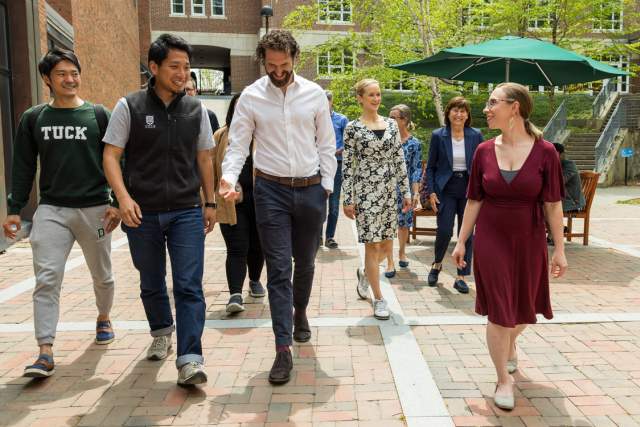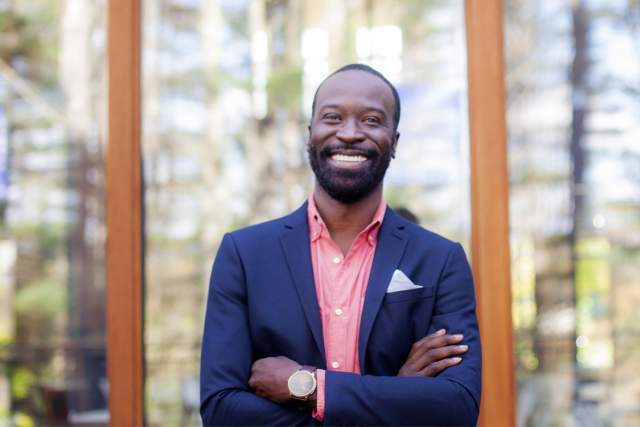As someone with a background in accounting, Ta-Von Wilson T’24 wanted to stay on track with his goals by incorporating metrics in meetings with his Personal Board of Advisers (PBA), like keeping track of how many coffee dates and lunches he was having with professors.
“I’m always focused on getting things exactly right or calculating things correctly,” says Wilson, who was recently named among Poets and Quants’ Best and Brightest MBAs of 2024.
Part of Tuck Compass—a holistic system that gives students the ability to identify their personal goals and chart their own path during their MBA journey—Tuck’s PBA program matches MBA students with advisers and personal leadership coaches who will support their individual goals and help bring clarity to their decision-making. Tuck Compass also includes resources like the MBA Planning Tool—a digital tool that allows students to define their MBA goals, view available courses and extra-curricular activities, and plan and track course enrollment—and curricular and cocurricular experiences that deepen students’ personal leadership skills and promote reflection.
When building his PBA team of advisers, Wilson decided to use the opportunity to “take the bull by the horns” and put together a board of eight individuals including C-suite executives, former Ernst and Young coworkers, private equity executives, Tuck Career Services staff, and more. The board meets once a quarter to talk about Wilson’s career and quality of life. He even invited Dean Matthew J. Slaughter to one of his recent PBA meetings.
“I was especially impressed at how two of the board members, whom Ta-Von seems to know well from over many years, were so frank in their reactions and suggestions,” Slaughter says. “I have always envisioned that students would craft these PBAs to enable robust conversations grounded in trust.”
Daniella Reichstetter T’07, executive director for Dean’s Office Special Projects, says the PBA program is “a journey with intention” that aligns with Tuck’s mission to provide a personal, connected, and transformative experience for students. It’s tailored to meet the needs of each student and doubles down on human interactions in a very digital world to pave the way for transformation.
“One thing that makes the PBA program work so well at Tuck is that we are a smaller, higher touch school, which means we can genuinely meet each student where they are,” she says.
Reichstetter says that there are around 150 Tuck alumni volunteering as advisers on the boards, many of whom have shared positive feedback about the program and are thrilled to have the opportunity to give back to Tuck. The most often cited source of satisfaction is the connection with current students, and the deep, personal relationships formed. More than one alum has told us, “I wish this was around when I was a student!”
Caitlin Mahoney T’25 came to Tuck hoping to pivot from higher education to consumer goods and opted into the PBA program because she was looking for solid mentors and “another set of eyes to complement her own self-awareness.” She matched with Alison Donnally T’18, founder of JoeyCo., calling Donnally her own “designated mentor, sounding board, cheerleader, ‘Tuck expert’ and advocate.”
“Thus far, my touchpoints with Alison have been incredible,” Mahoney says. One of her favorite activities they did together was design individual five-year plans, using the Designing Your Life book as inspiration. “It was a great way to share different versions of where I could envision my career and life going, and the most amazing part was that Alison was able to articulate back to me the values and goals that were embedded in the different visions of my life,” she says.
Donnally T’18 said the feeling was mutual, calling Caitlin’s “infectious” energy a fun way to stay connected to Tuck. “She brought a beautiful blend of clear-eyed organization and planning—paired with an open mind, creativity and curiosity—to her job search and overall Tuck experience,” Donnally says.
The first part of the matching process between students and alumni begins with a robust algorithm, which is then followed by Tuck Compass staff examining each match to confirm the right fit.
“The matching process to pair students with alumni advisers was especially fun for me to oversee, and I have gotten so much joy from hearing how their individual relationships have grown and flourished,” says Larissa Pyer, director of Tuck Compass.
Reichstetter said that during the matching process, alumni are asked a variety of questions, both personal and professional, about their expertise and strengths from an adviser perspective. She says that she finds that many alumni are interested in the program as a way to stay connected to Tuck.
These are people whose success I care about going forward. I want to know when they’re changing jobs, and I want to be that friendly adviser that they might need as they’re making those decisions.
— Matt Kummell T’06, Adviser; SVP of Operations, Digital Currency Group
“There are so many great ways to stay connected to Tuck—whether an alumni happy hour or reunion. The PBA program is another unique way that alumni can stay in the loop by gaining an immersive, one-on-one perspective on what Tuck looks like today,” Reichstetter says.
Matt Kummell T’06, a senior vice president in operations with Digital Currency Group, serves on a PBA board for two students interested in consulting and investment management. He says their honest conversations span not just career advice, but life matters, too.
“I think we’ve created a strong bond,” says Kummell, also an adjunct professor at Tuck. “These are people whose success I care about going forward. I want to know when they’re changing jobs, and I want to be that friendly adviser that they might need as they’re making those decisions.”
Thanks to guidance from his personal board of advisers, Ta-Von will start a full-time position with JP Morgan this summer in health care investment banking.
“They all brought in their own framework into evaluating my decision as to whether I should accept the job or not,” he says. And the best part is, Wilson’s PBA board will continue to meet quarterly once he graduates. “That’s exactly what the goal of Tuck is—you become alumni, but you still have the network.”

